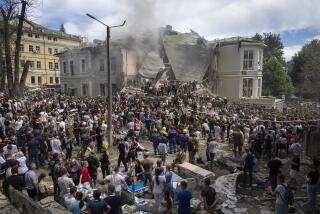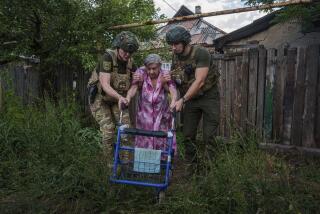Survivors Recall Brutal Assault on Chechen Town
SHALI, Russia — It was not an attack but a massacre, the survivors of Shali said Wednesday.
When the farmers of this town saw shiny cylinders falling from Russian warplanes Tuesday morning, they assumed they must contain more leaflets calling on the defiant residents of breakaway Chechnya to surrender their weapons to invading Russian forces.
Instead, the jets dropped cluster bombs and missiles on a roadside market, killing dozens of people and incinerating more than 14 cars, witnesses said.
Twenty minutes later, after villagers had come running to help the wounded, the planes circled back and struck again. An hour later, more planes returned to bomb the hospital where the wounded had been taken, as well as the school and a collective farm.
At least 55 people were killed and 186 wounded, including five medics hit by flying glass and shrapnel when a bomb blew out the windows of the operating room, said Zaur Musliyev, chief doctor of the Shali Central District Hospital. One woman was killed when a bomb struck the maternity ward, Musliyev said, but the baby she had given birth to a day earlier survived.
“This is pure barbarism,” he said. “They knew perfectly well this was a hospital.”
Russian President Boris N. Yeltsin ordered a halt to the bombing of Grozny, the heavily armed Chechen capital, as of midnight Wednesday “to prevent further victims among the civilian population.” The declaration was less ambiguous than a similar promise he made on national television a week ago to halt any bombing that might cause civilian casualties.
But Yeltsin’s latest order did not cover towns like this one, 18 miles south of Grozny, and it was not clear whether his commanders will obey. Since Yeltsin’s last pledge, Russian planes have rained terror not only on Grozny but also on farming towns, residential suburbs and mountain villages crammed with refugees.
Shali--a town of 30,000 that has swelled to 120,000 as Chechen families have extended their legendary hospitality to people fleeing the capital--has no conceivable military significance, residents said. The town’s only industry was a little candy-making plant. The Chechens say Russia has taken to bombing civilians out of spite, to retaliate for its humiliating failure to seize Grozny on New Year’s Eve.
“It’s just pure terror,” said Abdul-Vadood Islamgiriyev, 34, a resident of Shali.
At least 13,000 Russian troops invaded Chechnya on Dec. 11 in a bid to crush the tiny Muslim republic’s self-declared independence. They have been bogged down by indecision, poor coordination, low morale and spirited Chechen resistance.
In the startling New Year’s Eve rout, Chechen irregulars with Kalashnikov rifles, missile launchers and 500 grenade launchers held off a Russian armada of 200 tanks, 100 armored personnel carriers and a total of 2,500 soldiers, forcing them from the center of Grozny, according to Chechen military sources.
Russian lawmakers and Chechen fighters said Wednesday that there were signs that Yeltsin’s halt on bombing may foreshadow a second ground assault on Grozny. They said that Russian reinforcements--seasoned soldiers from the Urals instead of the raw draftees who have been chewed up by the Chechens--have arrived in Chechnya.
“We have enough bullets for all of them,” said Magomed Elihjiyez, who was returning from Grozny to his village to get food, change clothes and go back to the capital to fight.
Elihjiyez and other fighters fresh from Grozny said the Chechens were in full control of the central city except around the railway station, where Russian troops had dug in. Russian snipers had also taken up positions inside the city, they said.
Despite Russian efforts to seal off Grozny, it was clear that Chechen fighters had easy access. Several bands of guerrillas wearing Islamic green headbands showed up in Shali to see if their relatives had survived the attack, then headed back to Grozny.
The scene in Shali was sickening. In the muddy fields that had once been an impromptu roadside market for automobile parts, fresh blood still oozed into the mud. Not far away lay an unexploded cluster bomb--one of the most effective instruments yet invented for shredding human flesh. Its four-foot-long cylinder had split open and thrown dozens of shiny baseball-sized pieces across the field.
Some of the pieces contained balls a quarter-inch in diameter and others held needles, according to surgeons in Shali and the nearby town of Khasavyurt, who have been extracting the shrapnel from victims.
Most of the wounded were spared death only because the hospital in Shali did not suffer a direct hit, although nearly every window was blown to bits and its sides were pitted with shrapnel.
One of the survivors of Tuesday’s attack was a Russian prisoner, Lt. Oleg Podnosov, 22, who was recovering from abdominal surgery in the hospital. “Blasts were going on 10 meters away from me. It’s a miracle the bombs didn’t hit the building,” Podnosov said. “They’re acting like brutes, not human at all.”
On the other side of town, in the bomb-cratered courtyard of her farmhouse, Malika Ediyeva turned her 63-year-old face up to the sky that had just rained destruction on everything she had worked her whole life to build.
Ediyeva and her husband were at the funeral of three relatives who had died in the marketplace bombing when the planes streaked over their collective farm; thus she escaped being hit by the missiles, which cut a clean hole in the roof directly over her bed.
But her son was struck in the spine by a piece of shrapnel. After taking him to the hospital, she and her husband were burying the eight scorched corpses of the milk cows that lay in their wrecked barn. Even the bees in their carefully tended hives were killed by the shock of the explosion.
“How can they do this to peaceful people?” Ediyeva wailed.
“We voted for Yeltsin in 1991,” she added. “We wanted him to be president. We loved him. How could this be?”
More to Read
Sign up for Essential California
The most important California stories and recommendations in your inbox every morning.
You may occasionally receive promotional content from the Los Angeles Times.










